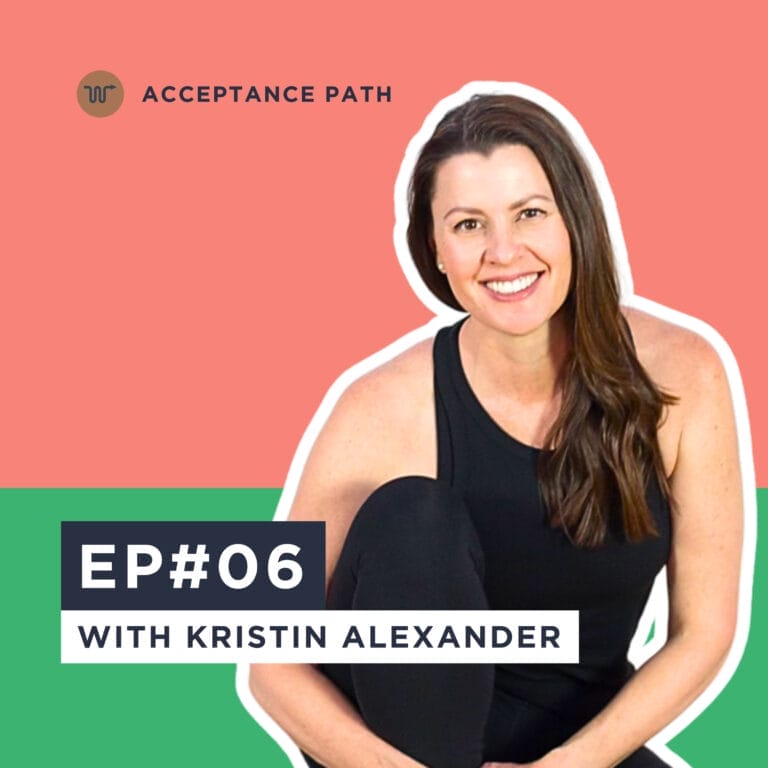
Two mental health experts have joined forces to make an uplifting podcast about well-being and personal growth. We use this show to share fresh and sometimes eye-opening ideas, helping listeners create a more fulfilling life. We’re not pushing any one viewpoint – instead, we’ll bring in guests from all walks of life to expand our understanding of the world. Come along with us as we explore different outlooks together.
Join Sheree Morgan & Kristin Alexander to discover how yoga can transform your mental health and reduce stress. Learn about the Eight Limbs of Yoga and their connection to modern therapy techniques. Explore practical breathing exercises and mindfulness practices you can use in daily life.

In today’s fast-paced world, stress overwhelms us, wreaking havoc on our bodies, minds, and emotions. Yoga, an ancient practice meaning “to connect, unite, or yoke to the true self,” offers a powerful antidote to modern-day stressors. On a recent episode of the Acceptance Path podcast, host Sheree Morgan interviewed Kristin Alexander, a yoga instructor, who shared her journey and insights into this transformative practice and its many yoga benefits.
A Journey to Yoga and Its Benefits
Kristin’s path to discovering yoga benefits began nearly 30 years ago, but she only fully embraced it as a complete practice about 15 years ago. As she explained on the podcast, “My journey to really embracing yoga as a complete practice and experiencing its full benefits has been pretty long. I feel like it started about 15 years ago.”
The Power of Breath: A Key Yoga Benefit
Kristin’s journey to understanding yoga benefits started with discovering alternate nostril breathing. This technique, recommended by a doctor for sleep issues, involves breathing through one nostril at a time. She shared, “I read an article about alternate nostril breathing, one of the many yoga benefits… I was struggling with sleeping at the time and this doctor recommended using the alternate nostril breathing in order to help calm the nervous system and allow the brain to draw air back, which helps sleeping.”
This experience sparked Kristin’s curiosity about the mind-body connection, another of the significant yoga benefits. “That was, I think, the beginning of my curiosity about the connection between the physical body and what is happening mentally,” she reflected.

Breathing exercises form a cornerstone of yoga practice and offer numerous benefits. Kristin emphasizes the importance of proper breathing, encouraging slow, deep inhales through the belly and engaging core muscles for exhales. She explained, “If I were to encourage someone to do anything to help change their experience of life and reap yoga benefits, it would be to learn how to properly breathe, to relax through the belly as you take a deep and slow inhale.”
This diaphragmatic breathing, one of the key yoga benefits, calms the central nervous system, lowers heart rate and blood pressure, and improves blood flow throughout the body. As Kristin noted, “Your breath is always with you. So it’s a tool that you can always utilize in any situation, whether you’re in an uncomfortable conversation with someone, you’re stressed out in traffic, you’re preparing to give a talk and you’re trying to calm your nerves. These are all situations where you can apply yoga benefits.”
The Mind-Body Connection: A Fundamental Yoga Benefit
The mind-body connection plays a crucial role in yoga and is one of its most profound benefits. Kristin experienced this firsthand when teaching her dyslexic daughter to read. She incorporated movements crossing the body’s midline into reading exercises, which not only improved her daughter’s reading ability but also enhanced communication skills in all her children.
Kristin shared this experience on the podcast: “We saw improvements with all of the kids, particularly in their ways of communicating… Not only was Hailey’s reading improving, but their ability to communicate was also improving. So I could see improvement in all of the kids, which really is, I don’t know, the human body is just miraculous. It’s one of those unexpected yoga benefits that extends beyond the mat.”
The Eight Limbs of Yoga: A Comprehensive Approach to Yoga Benefits
Yoga encompasses more than just physical postures. The Eight Limbs of Yoga, outlined in ancient texts over centuries ago, provide a holistic framework for living and accessing a wide range of yoga benefits. Kristin introduced these on the podcast, saying, “It’s an ancient text that was written over 2000 years ago, and it includes… this eight-limbed path, each offering unique yoga benefits.”
Yamas (External Restraints):
- Ahimsa: Non-violence in thoughts, words, and actions
- Satya: Truthfulness
- Asteya: Non-stealing, including ideas and credit
- Brahmacharya: Energy conservation
- Aparigraha: Non-greed and non-hoarding
Kristin explained, “The first five are the way that we externally interact with the world and they are designated as kind of the don’ts. Understanding and practicing these principles is one of the important yoga benefits.”
Niyamas (Internal Observances):
- Saucha: Cleanliness, including internal dialogue
- Santosha: Contentment
- Tapas: Transformation through disciplined practice
- Svadhyaya: Self-study and reflection
- Ishvara Pranidhana: Surrender to a higher power
About the Niyamas, Kristin said, “The second limb of yoga are… the way you’re internally interacting with self. And those are the dos. These internal practices offer significant yoga benefits for mental and emotional well-being.
Asana: Physical postures, preparing the body for meditation
Kristin clarified, “That’s what most people think of as yoga, the physical postures. But Asana also literally translated means to sit. The physical yoga benefits are often the most visible, but they’re just one part of the practice.”
Pranayama: Breath control techniques
Pratyahara: Sensory withdrawal
Kristin described this as “acknowledging how, what externally, what external stimuli you’re experiencing. Learning to manage these stimuli is one of the valuable yoga benefits for dealing with stress.”
Dharana: Focused concentration
Dhyana: Meditative absorption
Kristin explained this as “when really there is kind of this full release. You really do practice in order to get to a place where you’re experiencing that sensory withdrawal. This deep state of meditation is one of the profound yoga benefits for mental clarity.”
Samadhi: Complete union with the divine
Kristin described this final limb as “that ultimate form of surrender, and connection with our higher power. While this may seem abstract, it’s one of the most transformative yoga benefits.”
Yoga for Stress Management: A Critical Benefit in Modern Times
The American Psychological Association reports a significant increase in chronic illnesses and mental health diagnoses since the COVID-19 pandemic began. Sheree Morgan shared some alarming statistics on the podcast: “Data suggests the long-term stress sustained since the COVID-19 pandemic began has had a significant impact on wellbeing, which is evidenced by an increase in chronic illnesses, especially among those between ages of 35 and 44, which increased from 48 percent reported in 2019 to 58 percent in 2023. This makes the stress-reduction yoga benefits more important than ever.”
Long-term stress requires different coping skills than temporary stressors. Yoga offers practical tools for managing stress in everyday situations, one of its most valuable benefits. For example, when stuck in traffic, instead of succumbing to road rage, one can practice deep breathing and body relaxation, applying yoga benefits in real-life situations.

Kristin provided a practical example: “If you come up to a red light, you’re running late, you can’t make the light turn any faster… you physically do what you can do. You’re driving or you’re stopping and then you relax through your belly. You take a deep breath. You come back to your breathing and you just be and just are. This is how you can apply yoga benefits in everyday life.”
This shift in perspective can transform stressful situations into opportunities for mindfulness and self-care, showcasing the practical yoga benefits. Sheree added her own experience: “I used to again, Houston traffic is bad. And so sometimes you just get caught in it and there’s nothing you can do. But I think our natural reaction to that is to react in a way that’s, ‘Oh, I hate being in this traffic.’ So then we have this associative behavior that goes with being stuck in traffic. But if you can shift that to being mindful, you’re tapping into the yoga benefits of mindfulness and stress reduction.”
Recently, AJ wrote an in-depth article on what mindfulness is. He explored the benefits and some of the most common misconceptions on the practice. Click here to read more.
The Physical and Mental Benefits of Yoga
Yoga’s benefits extend beyond stress reduction. The practice improves flexibility, strength, and balance while promoting mental clarity and emotional regulation. By integrating movement, breath work, and meditation, yoga addresses both physical and mental well-being, offering a comprehensive range of yoga benefits.
Kristin emphasizes the reflective nature of yoga practice: “The physical practice, you’re in a class, you make it into a posture, a movement. And you’re asked to hold that posture, and it might be super uncomfortable. And then what happens is the mind starts to fluctuate, and you start to tell yourself certain things… Well, that happens in life too. This self-awareness is one of the key yoga benefits that translate to everyday life.”
This self-awareness cultivates resilience and equanimity in facing life’s challenges. As Kristin explained, “I think there’s just a practical application to life off of the yoga mat, is the whole purpose of yoga. The yoga benefits you experience on the mat are meant to be carried into your daily life.”
Yoga and Mental Health: Expanding the Scope of Yoga Benefits
The connection between yoga and mental health is particularly relevant in today’s high-stress world. Sheree shared more statistics from the American Psychological Association: “Adults ages 35 to 44 also experienced the highest increase in mental health diagnoses from 31 percent reported in 2019 to 45 percent in 2023. Though adults ages 18 to 34 still reported the highest rate of mental illnesses at 50 percent in 2023. These statistics highlight the importance of the mental health benefits of yoga.”
Kristin highlighted how yoga principles align with modern therapeutic techniques: “When you’ve told me about different therapeutic techniques that you use with your clients, it reminds me of the yoga sutras, which literally were written over centuries ago, but they’re reflective of some of the techniques that are used in modern day therapy. This alignment showcases how the yoga benefits for mental health have been recognized for millennia.”
This alignment underscores the timeless wisdom of yoga and its relevance to contemporary mental health practices, emphasizing the enduring nature of yoga benefits.

Yoga for All: Accessible Yoga Benefits
While often associated with complex physical postures, yoga remains accessible to everyone. The essence of yoga lies in finding a comfortable seated position and connecting with one’s breath. Even simple practices can yield profound benefits for physical and mental health, making yoga benefits available to people of all ages and fitness levels.
Kristin emphasized this point: “It doesn’t have to be handstands and headstands and splits. It can simply mean to find a seat and to sit in a posture that will support the process of meditation. This accessibility is one of the most important yoga benefits.”
As Kristin notes, “There is a very beautiful connection between what happens in the physical body and what’s happening in your mind.” Yoga provides helpful tools to calm stress, fostering a deeper understanding of oneself and one’s place in the world, which are essential yoga benefits in our fast-paced society.
Embracing yoga as a holistic practice rather than mere exercise can lead to transformative experiences. It offers a path to greater self-awareness, contentment, and connection with something greater than oneself, all profound yoga benefits.
Kristin shared her personal experience: “As I have journeyed through this path of yoga, it’s been exciting to discover the connection between the physical body and what’s happening in my mind and it stops me a lot to consider the way that I’m approaching certain situations, the way that I’m thinking about myself and coming back to what’s true, coming back to the things that I can and I can’t control. These realizations are some of the most impactful yoga benefits I’ve experienced.”
Integrating Yoga into Daily Life: Maximizing Yoga Benefits
One of the most powerful aspects of yoga is its applicability to everyday life. Sheree reflected on this, saying, “When we can wrap our mind around engaging all of those senses, the sensories, what that does is it ignites lots of different pieces and parts of the brain. And so that you’re talking about engaging, recognizing all of these things, awakens the brain and then being able to withdraw those deliberately. That’s a beautiful picture of deliberately reducing things to bring yourself to a peaceful, calm place. These are the kind of yoga benefits that can truly change your life.”
Kristin agreed, adding, “Isn’t it amazing that over 2,000 years ago, this was a technique that was practiced. The longevity of these yoga benefits speaks to their effectiveness.”
The practice of yoga extends far beyond the mat. Its principles can be applied to daily interactions, thought patterns, and responses to stress. As Sheree noted, “Going through these limbs of self-realization, recognizing my thoughts, my actions, and how all of those things interact in my daily life. And how can I bring myself back into myself a little bit and connect with the Lord and connect with being content in the situation that we are in is really important. These are the deeper yoga benefits that can transform our entire approach to life.”

Conclusion: Embracing the Full Spectrum of Yoga Benefits
In our stressful modern world, the ancient wisdom of yoga and its myriad benefits provide a timeless remedy. By integrating its principles into daily life, we can cultivate greater peace, resilience, and well-being. Whether through formal classes or simple breathing exercises, yoga offers powerful tools for navigating life’s challenges and finding inner calm amidst the chaos.
As Kristin beautifully summarized, “Sometimes it’s just as simple as relaxing and deeply, slowly breathing.” This simple act encapsulates many of the core yoga benefits.
The Acceptance Path podcast conversation between Sheree and Kristin illuminates the profound impact yoga can have on our physical, mental, and emotional well-being. It reminds us that in a world full of external stressors, we always have access to an inner sanctuary of peace through the practice of yoga and its numerous benefits.
By embracing yoga’s holistic approach to health and well-being, we can learn to navigate life’s challenges with greater ease, cultivate deeper self-awareness, and foster a sense of connection with ourselves and the world around us. In doing so, we open ourselves to a path of acceptance, growth, and transformation that can enrich every aspect of our lives. These transformative experiences are perhaps the most profound of all yoga benefits.
As we continue to explore and experience the vast array of yoga benefits, we invite you to embark on your own yoga journey. Whether you’re seeking stress relief, physical fitness, mental clarity, or spiritual growth, the yoga benefits are there for you to discover. Remember, the path of yoga is a personal one, and the benefits you experience may be unique to you. Embrace the practice, be patient with yourself, and allow the yoga benefits to unfold in your life naturally.
Can’t get enough of our episodes? Check out the previous episode where we interviewed Dr. Frank Morgan on how your diet can affect your mental health. Click here to check out the episode.
Also check out our 4th episode where AJ and Sheree discuss how alcohol can worsen your mental wellbeing in a shocking way. Click here to listen or read more.



